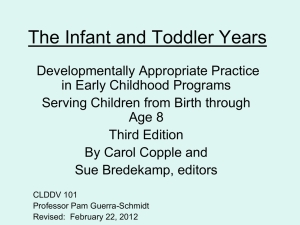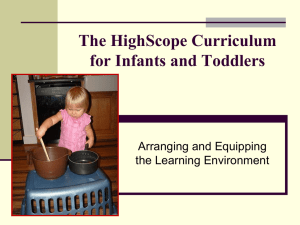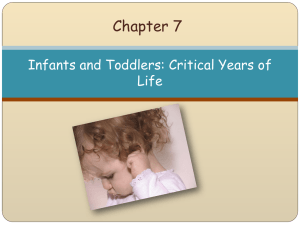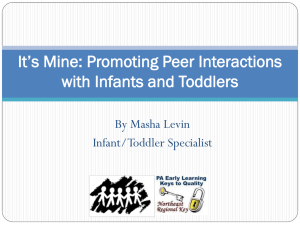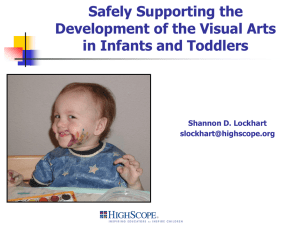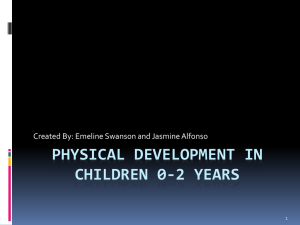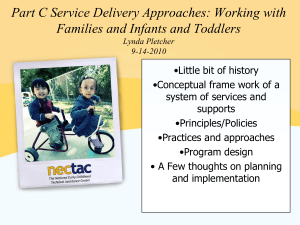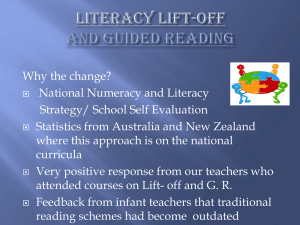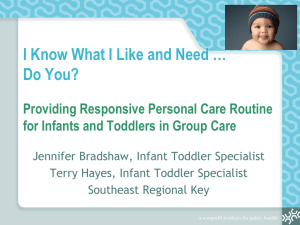EDN 450: Infant and Toddler Program Models
advertisement
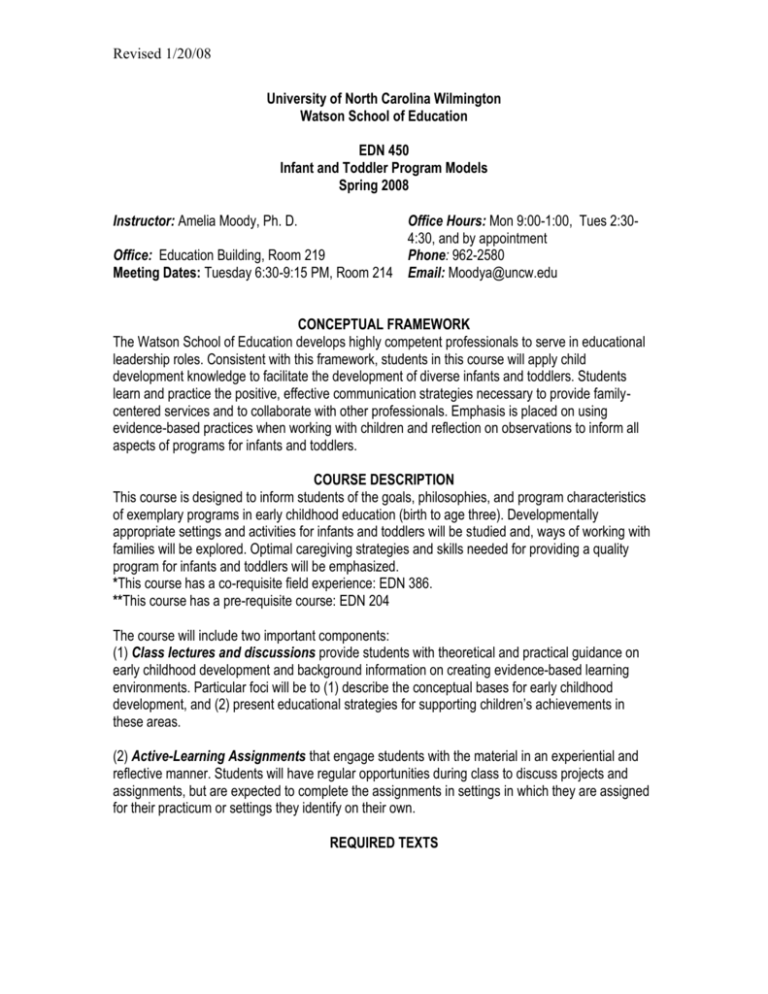
Revised 1/20/08
University of North Carolina Wilmington
Watson School of Education
EDN 450
Infant and Toddler Program Models
Spring 2008
Instructor: Amelia Moody, Ph. D.
Office Hours: Mon 9:00-1:00, Tues 2:304:30, and by appointment
Office: Education Building, Room 219
Phone: 962-2580
Meeting Dates: Tuesday 6:30-9:15 PM, Room 214 Email: Moodya@uncw.edu
CONCEPTUAL FRAMEWORK
The Watson School of Education develops highly competent professionals to serve in educational
leadership roles. Consistent with this framework, students in this course will apply child
development knowledge to facilitate the development of diverse infants and toddlers. Students
learn and practice the positive, effective communication strategies necessary to provide familycentered services and to collaborate with other professionals. Emphasis is placed on using
evidence-based practices when working with children and reflection on observations to inform all
aspects of programs for infants and toddlers.
COURSE DESCRIPTION
This course is designed to inform students of the goals, philosophies, and program characteristics
of exemplary programs in early childhood education (birth to age three). Developmentally
appropriate settings and activities for infants and toddlers will be studied and, ways of working with
families will be explored. Optimal caregiving strategies and skills needed for providing a quality
program for infants and toddlers will be emphasized.
*This course has a co-requisite field experience: EDN 386.
**This course has a pre-requisite course: EDN 204
The course will include two important components:
(1) Class lectures and discussions provide students with theoretical and practical guidance on
early childhood development and background information on creating evidence-based learning
environments. Particular foci will be to (1) describe the conceptual bases for early childhood
development, and (2) present educational strategies for supporting children’s achievements in
these areas.
(2) Active-Learning Assignments that engage students with the material in an experiential and
reflective manner. Students will have regular opportunities during class to discuss projects and
assignments, but are expected to complete the assignments in settings in which they are assigned
for their practicum or settings they identify on their own.
REQUIRED TEXTS
Revised 1/20/08
Gonzalez-Mena, J. (2007). Infants, toddlers, and caregivers: A curriculum of respectful, responsive
care and education (7th ed.). Boston: McGraw Hill. ISBN #0-0-7287783-9.
Gonzalez-Mena, J. (2007). The Caregivers companion (7th ed.). Boston: McGraw Hill. ISBN #0-07313132.
Gonzalez-Mena, J. (2007). Diversity in Early care and Education: Honoring Differences (5th
Edition). ISBN #0-07-352586.
SUPPLEMENTAL READINGS
Students are required to read several supplementary articles and handouts over the course of the
semester. These articles will be handed out in class or made available online.
COURSE OBJECTIVES AND OUTCOMES
Upon completion of this course students should be able to:
1. Describe the historical development and philosophical bases of infant and toddler
programs, including programs for infants and toddlers with special needs. (B-K 1; PES 3)
2. Identify and evaluate major theoretical views and nationally recognized program models of
infant and toddler care and education. (B-K 1; PES 3)
3. Demonstrate understanding of infant and toddler development by incorporating
developmental knowledge into the planning and implementation of programs and
environments for very young children with a wide range of individual needs. (B-K 1, 6, & 7;
PES 1 & 3)
4. Create appropriate learning environments or adapt existing environments and select
appropriate materials to facilitate the development of infants and toddlers with both typical
and atypical needs. (B-K 6; PES 4)
5. Implement a variety of appropriate teaching strategies to encourage the sensorimotor,
adaptive, social, emotional, language/communication, cognitive, aesthetic, and physical
development of infants and toddlers, including provision of group and individual activities,
facilitation of learning during exploration of physical objects, inclusion of both child- and
adult-initiated activities, and appropriate use of technology. (B-K 7, PES 2 - 4)
6. Establish appropriate guidelines and implement appropriate positive guidance strategies to
help infants and toddlers with typical or atypical needs develop self-regulation, solve
problems, develop independence, and interact successfully in group settings. (B-K 4; PES
2-4)
7. Demonstrate skill in collecting data about children from naturalistic observation and the
results of specialized assessments, using that data to plan appropriate environments and
interactions that meet individual goals, assessing individual children’s learning and
progress, and evaluating program effectiveness. (B-K 5 & 7; PES 5).
8. Demonstrate knowledge of how disabilities, delays and risk factors impact development by
planning appropriate strategies for the inclusion of infants and toddlers with special needs
in group care, designing appropriate learning activities, and working with families to meet
needs of infants and toddlers with special needs. (B-K 1 & 7; PES 1, 3 & 6)
9. Develop, implement, and evaluate Individualized Family Service Plans (IFSP) for infants
and toddlers who are developing atypically, in partnership with family members and other
agencies or professions, with a focus on family strengths, incorporating both child and
family strategies, and integrating knowledge and strategies from different professional
Revised 1/20/08
10.
11.
12.
13.
14.
15.
team members. (B-K 7; PES 7 & 8)
Demonstrate understanding of infant/toddler development in the context of the family,
including the impact of a child with typical or special needs on the family system, and
research about the impact of parents on children’s learning and development. (B-K 3; PES
1 & 3)
Develop collaborative relationships with families to meet the developmental needs of
infants and toddlers, including support of parent-child relationships and referral to other
appropriate family resources. (B-K 3 & 9; PES 8)
Facilitate smooth accomplishment of transitions often encountered by infants and toddlers,
including from hospital to home, from home to childcare, and from infant/toddler settings to
preschool. (B-K 10; PES 3)
Demonstrate attitudes that indicate respect for diverse cultural values and family
structures, develop culturally sensitive program policies and practices that demonstrate
behaviors that assist families from different cultural settings. (B-K 9, NCATE Diversity
Standard 4; PES 10)
Demonstrate skills for working collaboratively with other adults, including interacting
effectively with staff, assistants, and volunteers, initiating and conducting interdisciplinary
teams, and resolving conflicts. (B-K 10; PES 10)
Demonstrate understanding of and willingness to assume the multiple roles of the
infant/toddler educator: consultant, researcher, decision-maker, child advocate, and
lifelong learner. (B-K 10; PES 10)
Staying On Track
Class lectures and additional relevant materials are available on the class website. Please check
regularly so you are able to come to class prepared. At the start of some class sessions, we’ll have
quizzes that will cover the assigned readings. Please be prepared for these quizzes. They will help
you stay on track over the course of the semester and provide you with a helpful study guide for
the final exam.
COURSE POCLICIES
Accommodations for students with disabilities: If you are a person with an identified disability
that may prevent you from participating successfully or from meeting course requirements, you
must notify Disability Services (Westside Hall, 962-3746), provide the necessary documentation of
the disability, and arrange for the appropriate authorized accommodations. Once these
modifications are approved, please bring the documentation to me in a timely manner (i.e., within
the first 2 weeks of the semester) so that we can be certain to implement the accommodations for
your success in this class. Course requirements will not be waived, but accommodations may be
made to assist you in completing them.
Academic Integrity: All students are expected to adhere to the requirements of the UNCW
Student Handbook and Code of Student Life (Section 1, pp. 6-10). Responsibilities in this area
include, but are not limited to, cheating, plagiarism, and improper or illegal use of technology.
Violation of the Honor Code may result in a failing grade in the course.
PROFESSIONAL AND ETHICAL CONSIDERATIONS
As a student in the Education of Young Children (EYC) program at UNCW, you are also an early
Revised 1/20/08
childhood professional and a representative of the Watson School of Education. As such, you are
responsible for knowing and following the guidelines specified in the Watson School of Education
Standards of Professional Conduct. These standards may be viewed on the Watson School of
Education website: http://www.uncw.edu/ed/.
This course, like others in the EYC program, gives you the opportunity to demonstrate commitment
to your own professional development and to practice professional norms and standards of
behavior in all interactions with fellow students, instructors, cooperating field experience teachers,
parents, and children. As part of this course, students are expected to demonstrate professional
attitudes and behaviors at ALL times, including:
•
•
•
•
•
•
•
•
Take responsibility for your own learning and self-improvement;
Remain open to the ideas and suggestions of others;
Actively critique your own performance;
Collaborate and cooperate actively with classmates during group work;
Adhere to professional norms of dress and conduct;
Use standard English in oral and written communications;
Prepare thoroughly for field-based assignments;
Keep all appointments and follow through on all commitments, or promptly notify all
individuals who are affected if you are unable to do so;
• Adhere to rules and standards established by field experience sites
• Keep your cell phones, PDA’s, etc. turned off or muted while in class, meetings, etc. as a
courtesy to those around you
Observing children in early childhood settings and collecting data requires participating in activities
with them. These learning experiences require professional ethics and confidentiality:
• Any information that is learned about a particular program or a child and his/her family
should be discussed only with the staff of the program, the instructor, and other students in
the context of class learning activities.
• Such information should be shared only with the purpose of enhancing your learning and that
of your peers, not as gossip.
• All information should be treated as confidential. Information about children, families and
programs that is discussed in class should not be discussed outside of class.
• To help ensure confidentiality, use pseudonyms for children in any written work.
• Students must respect children’s rights to humane and beneficial treatment as the subject of
study. Students are responsible for assuring children’s personal comfort during activities and
respecting children’s right to refuse participation in activities.
• Students are expected in interact with children and adults without prejudice or partiality and
to refrain from imposing any personal views or values upon children or adults.
TASKSTREAM REQUIREMENT
The Watson School of Education (WSE) requires that all education majors enrolled in methods
courses maintain an active account on TaskStream, a web-based curriculum builder and portfolio
toolset (www.taskstream.com). You are asked to maintain that account for the duration of your
program with the WSE. Students in methods courses will use TaskStream to maintain a
Professional Development (or Licensure) Portfolio; this portfolio includes evidence of your work to
demonstrate progress toward meeting exit requirements and professional standards. A
Revised 1/20/08
TaskStream account is required for EDN 450.
COURSE ASSIGNMENTS & GRADING
1. Participation/attendance
20 points
2. Quizzes
20 points
3. Infant and Toddler Readings, References, & Resources 20 points
4. Field Assignments
50 points
5. Environmental Evaluation
30 points
6. DAP Infant/Toddler Plan
50 points
7. IFSP
40 points
8. Final Exam
70 points
300 points
A = 90-100% (270-300 points)
B = 80-89% (240-269 points)
C = 70-79% (210-239 points)
D = 60-69% (180-209 points)
F = 59% or below (179 points or below)
ASSIGNMENT DESCRIPTIONS
Participation: Attendance/Participation – 20 Points
Students are expected to be present at all classes, unless there are reasonable circumstances
beyond control (e.g., medical emergency). For each absence, your attendance participation score
will be deducted 5 points, following the first absence. All absences should be addressed via phone
or email (either before or after absence). University excused absences for religious holidays or
court subpoena will be accepted without penalty. If you are unable to attend a class, it is your
responsibility to get notes and assignments from a peer. It is also expected that students will have
completed all assignments and readings prior to class. Students are also expected to take
leadership roles in particular class discussions, participate in role-plays or dramatizations, and/or
share their expertise in other ways.
Quizzes- 20 points- Jan 22nd and Feb 19th
You will have 2 announced quizzes (10 points each) over the course of the semester. If you miss
class without notifying the instructor prior to class and a quiz is given, you may complete the quiz
but will only receive 50% of the total possible points. Additionally, you have the opportunity to
receive up to 10 points of extra credit by completing the online quizzes associated with your
textbook (www. Mhhe.com/itc7e). These quizzes provide you with opportunities to test your
knowledge on the information covered in your chapter readings. When you’ve completed the quiz
e-mail it to me. Each completed quiz is worth 2 points and you can complete up to five for credit
(10 points).
Infant and Toddler Readings, References, & Resources – 20 points- Feb 5th-Mar 11th
You are asked to take responsibility for your own learning and for contributing to the learning of
Revised 1/20/08
others by actively selecting and contributing appropriate readings (as assigned in class). You will
be responsible for the following: Feb 5th-Mar 11th
1. Come to class with an article relevant to the assigned topic;
2. Be prepared to use the reading to lead a class discussion or activity;
3. Have copies of the reading for your classmates at least one week prior to your presentation
date.
Points will be awarded on the quality of the reading selected, preparedness, and on your ability to
utilize its contents to support your discussion and activity.
Topics are as follows:
Group #1 (Feb 5th ): Developmental Milestones/Integrating Goals into Play
Group #2 (Feb 12th ): Quality Infant/Toddler Environments
Group #3 (Feb 19th): Individualized Family Service Plan
Group #4 (Feb 26th): Working with Families
Group #5 (Feb 26th): Diversity
Group #6 (Mar 11th): Providing Instruction to Develop Motor Skills
Field Assignment– 50 Points – Due throughout semester
As part of your EDN 386 infant/toddler program field experience, you are asked to develop an
Activity Plan for an atypically or typically developing child.
Part 1 (due Feb 12th):
1. Observe and collect anecdotal data on an atypically developing child for a minimum of
30 minutes;
2. Discuss your observation notes with your cooperating teacher;
3. Interview and conference with your cooperating teacher to collect more data on any
observable behaviors you may choose to address;
Using the above information, write up a 1-2 page summary with the following components:
1. Background Information
Describe the child, the setting of your observation, and briefly describe the staff and
materials used during the observation (those relevant to the target behavior)
2.Evidence of Data Collection tools
Attach copies of your hand-written data collection sheets (interview, observational notes, etc.)
and describe how they were utilized to choose the targeted behavior.
3. Target Behavior
Choose one target behavior you believe the child should work on based on your notes.
Make sure you describe the behavior in observational terms (e.g., When Maya gets angry
she throws her food dish on the floor using two hands).
Part 2 (due Mar 25th):
1. Develop an activity that addresses the target behavior;
2. Create an Activity Plan (See form in 386 syllabus) in TaskStream
1. Get cooperating teacher’s approval of activity plan (this does NOT have to be written
Revised 1/20/08
permission)
2. Write an artifact caption and insert into portfolio
Points will be awarded on the thoroughness of your data and conference notes (10 points); the
appropriateness of your goal for the specified need/creativity of your activity or toy/attention to
detail in the Activity Plan (20 points); and the thoroughness of your Activity Plan (10 points). {This
assignment is required for your portfolio (PES 1, 6, & 7)}
Environmental Evaluation – 30 Points – Due upon completion of your I/T field placement
(due by April 22nd. You may turn this assignment in early)
You will carefully study, evaluate, and reflect upon the learning environment of a selected infant or
toddler caregiving environment. To do this, you will (1) administer one section of the Infant and
Toddler Environmental Rating Scale - Revised (ITERS-R); and (2) after completing your
assessment, you will develop a brief summary of your findings with a list of five or more specific
recommendations for improving the early childhood learning environment of the site based on
recommendations from reading materials and other citations of your choosing. Submit a 2-4-page
report (double spaced) with all completed protocols.
NOTE: If you work full time in a classroom setting you will complete this evaluation on your current
classroom. Please see me for more information before beginning your assignment.
Developmentally Appropriate Infant and Toddler Program Plan – 50 Points – Due Apr 8th
You will develop a detailed plan for a high-quality, developmentally appropriate infant-toddler
program. You will be required to select an activity from this project to include in your portfolio.
This assignment requires you, working independently, to do the following:
1. Develop a philosophy statement for your program to reflect the mission of your educational
center. This philosophy statement will guide the overall function and operation of your
program. Philosophy statements should be no more than 3 sentences long.
2. Create a brochure/parent handbook that include:
a. Descriptions of environments for infants and toddlers
i. Describe your environment(s) visually as well as narratively. For example,
you should include a diagram of your center (assume that you have 5
infants and 10 toddlers) AND write a description of what is in the
environment(s). Make sure this diagram is in line with your personal
philosophy statement. A 1-2 page description of each environment is
appropriate.
b. Activities and materials to promote typical and atypical development in all domains
i. This list does not need to be intensely specific list of materials (e.g., baby
powder, wipes, gloves, etc.) or activities (e.g., peek-a-boo and tummytime), but you should provide enough detail so that parents who want to
know what will be happening throughout their child’s day will be informed.
Revised 1/20/08
(E.g., “centers” is not a sufficient description but storybook reading and
song time would be appropriate)
c. Supporting detail (i.e., literature) to demonstrate the appropriateness of the activities
and materials.
ii. This will be the main section of your plan. Use literature from this course
(e.g., textbooks, articles, etc.) to provide a rationale for your plan and
include references for everything you take from an article or book. For
example, Why is your environment set up that way? Why are you doing
these activities? Why are you using those materials?
b. Additionally, you should have consistency between your philosophy statement and
your activities. For example, if your mission is to create a community of learners,
but you keep children segregated all day or leave out the families during activities,
there is a discord.
Individualized Family Service Plan (IFSP) – 40 Points – Due Mar 11th
You need to write an IFSP for a fictional student. You will complete an IFSP document for this
target child. You will receive more information on this assignment in class. {This assignment is
required for your po
Final Exam – 70 Points – Due May 6th by 5:00 PM
The final exam for this class will be due on Tuesday, May 6th at 5:00 PM. Exam questions will
assess your understanding of major concepts and factual material as well as your ability to apply
the information appropriately. The exam questions will be created from the materials covered in
your readings, quizzes, class activities, and assignments.
WRITING EXPECTATIONS
With a few exceptions, every assignment in this course requires that you turn in word-processed
written work. Organization, clarity, punctuation, spelling, grammar, and neatness are very important
in any type of professional writing, and adequate performance in all of these areas is expected in
the written products required for this course. Points may be deducted from assignment grades for
errors in the above-mentioned criteria.
Additional writing expectations include:
• Word processed (NO handwritten work will be accepted unless otherwise specified)
• Double-spaced
• 12-point font
• Times New Roman or Arial fonts preferred
• 1” top and bottom margins; 1.25” side margins
• NO bullet points or numbered lists
• Name and title located on a separate cover page
• Stapled
Revised 1/20/08
Assignments are due at the beginning of class. Late work will be deducted 5 points per day.
*You are also encouraged to attend Infant/Child CPR class for certification. For more information
you can contact Priscilla Sykes from UNCW/ EH&S at 910-962-3057 for dates and fees.
*This syllabus is a fluid document and may change throughout the semester. Please check your
class website regularly for updates.
Revised 1/20/08
COURSE CONTENT AND ORGANIZATION*
DATE
Jan 15
Jan 22
TOPIC(S)
Review of Syllabus; Course overview
Introduction to Taskstream
History, Philosophy, & Theory of Infant and
Toddler Programs; DAP
READING(S)
ASSIGNMENT(s)
Ch. 1 &2 (Gonzalez-Mena & Eyer,
2001)
*Bredekamp (pp. 33-94)
*Hohman & Weikart
*Dodge & Colker
Quiz 1
Jan 29
Curriculums
Feb 5
Overview of Child Infant/Toddler
Development (Major milestones; Individual
differences);Integrating goals (Daily
activities; Play and activities)
Quality Infant/Toddler Environments
ITERS
Ch. 3 & 4 (Gonzalez-Mena & Eyer,
2001)
Ch. 6 (Gonzalez-Mena , 2008)
RRR Group 1
article/activity
Ch. 12-14 (Gonzalez-Mena & Eyer,
2001)
*Miller (Ch. 11)
Feb 19th
IFSP Development
*Gronlound Ch.5
*Jung & Grisham-Brown (2006)
RRR Group 2
article/activity
Field Assignment part I
due
Quiz 2
RRR Group 3
article/activity
Feb 26
Providing instruction in Social and Play Skills
Assessing Family Resources, Priorities, and
Concerns; Working with Families; Diversity
Ch. 10 & 11 (Gonzalez-Mena &
Eyer, 2001)
Ch 1-3 (Gonzalez-Mena , 2008)
RRR Group 4 & 5
article/activity
Mar 4th
Mar 11th
NO CLASS
SIDS Training-Guest Speaker (Linda King)
Review SIDS materials on
http://www.sids.org/
RRR Group 6
article/activity
IFSP due
Mar 18th
Providing Instruction in Children’s Cognitive
Skills
Assessing and Providing Instruction in
Children’s Adaptive and Self-Care Skills
Ch. 8 (Gonzalez-Mena & Eyer,
2001)
*Bailey & Wolery (Ch.14)
Mar 25th
Assessing and Providing Instruction in
Children’s Motor Skills
Ch. 7 (Gonzalez-Mena & Eyer,
2001)
Apr 1st
Working with Children with Disabilities;
Adapting the Curriculum
Providing instruction in Children’s Language
& Communication Skills
TBD
Apr 15th
NICU Tour
Apr 22nd
Using Assistive Technology to Support
Differentiation in the Classroom
Ch. 5 (Gonzalez-Mena & Eyer,
2001)
Bring scissors to class with you
Apr 29th
Issues and Trends
Feb 12
Apr 8th
Ch. 9 (Gonzalez-Mena & Eyer,
2001)
Last day of classes
MAY 6th (5PM): DUE DATE/TIME FOR FINAL EXAM
Field Assignment Part 2
DAP I/T Plan Due
Environmental Evaluations
due
Hand out final exam
